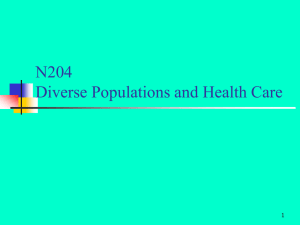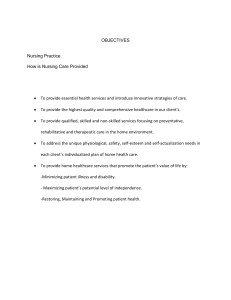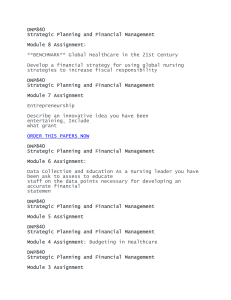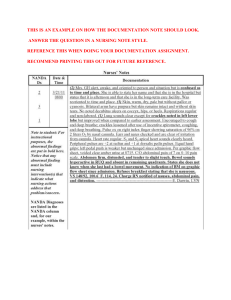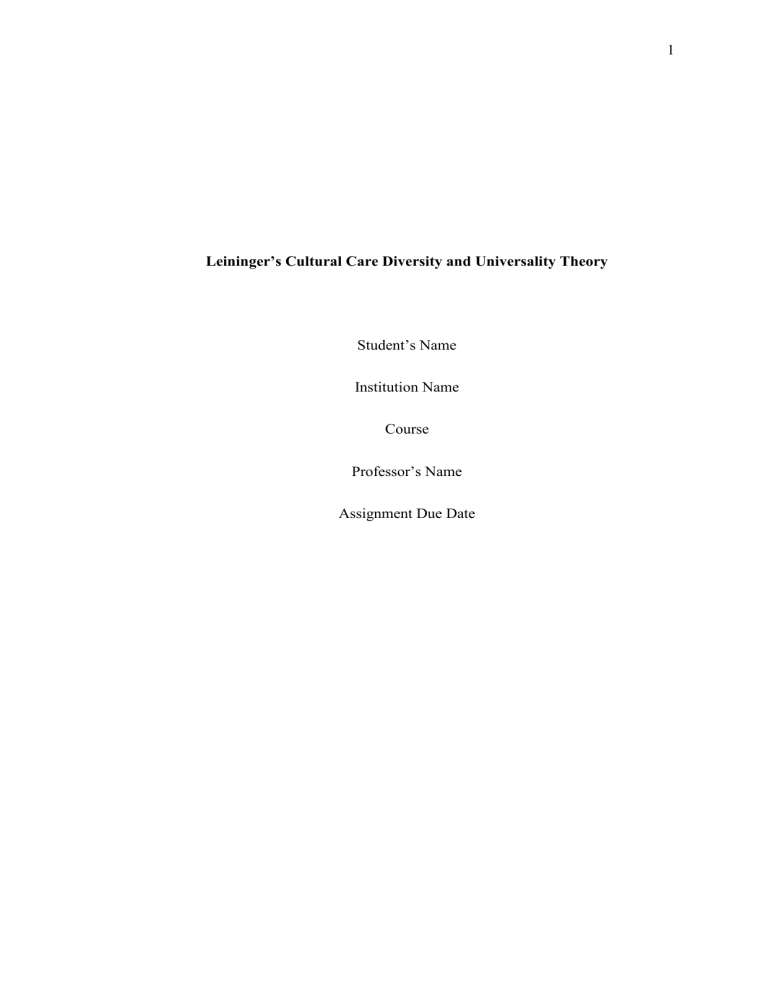
1 Leininger’s Cultural Care Diversity and Universality Theory Student’s Name Institution Name Course Professor’s Name Assignment Due Date 2 According to Melanie and Evelyn (2018, pp 222), nursing is a dynamic discipline that constantly develops to meet the different complex needs of individuals from various cultural backgrounds. Madeleine Leininger made significant contributions by emphasizing the pivotal role of culture in healthcare and the need for culturally congruent nursing care. Leininger's Cultural Care Diversity and Universality Theory laid the foundation for transcultural nursing through offering a framework for understanding and delivering culturally sensitive care. This paper explores the major concepts, purpose, context for use, nursing implications, empirical testing, and practical applications of Leininger's theory. Major Concepts Leininger's theory is built upon several major concepts like culture, culture care similarities (universals), culture care and culture care differences (diversities) within the context of transcultural human care. In this theory, culture encompasses the values, beliefs, practices and lifeways that shape an individual's identity (Melanie & Evelyn, 2018, pp. 222). Culture care refers to the holistic personalized care that takes into account cultural background of a patient. Leininger also introduces the concepts of emic view (specific to a culture) and etic view (universal across cultures) which highlights the importance of understanding both perspectives. Other main ideas within the theory are care, culturally congruent nursing care, caring, professional system of health care and lay system of health care. Purpose and Context for Use According to McFarland and Wehbe-Alamah (2019, pp. 550), Leininger's Cultural Care Diversity and Universality Theory is about understanding the vital connection between care and culture. It serves as a practical guide for nurses and healthcare professionals to 3 ensure that care aligns with a patient's unique cultural beliefs and practices, fostering a more personalized healthcare experience and improved health outcomes. This theory not only influences nursing education but also shapes healthcare policies, making healthcare more culturally sensitive and inclusive. In a world of diverse healthcare needs, it is the key to providing compassionate care that transcends borders and disciplines. Nursing Implications This theory provides a guiding principle that beckons nurses to embark on a journey towards culturally congruent care that genuinely honors each patient's cultural roots (Melanie & Evelyn, 2018, pp. 222). This journey entails getting deeper into the tapestry of cultural values, beliefs and practices by leveraging this understanding to customize care that aligns perfectly with the unique needs of each patient. Culturally congruent nursing care is essential for enhancing patient outcomes, elevating patient satisfaction and narrowing the chasm of healthcare disparities. Evidence of Empirical Testing and Application in Practice Leininger's Cultural Care Diversity and Universality Theory has thrived over the years, standing strong in rigorous empirical testing and widespread application in nursing research and practice (Jeffreys & Zoucha, 2016, pp. 113). It has been the foundation for numerous studies exploring various health topics and diverse cultural groups from Latino subgroups' health beliefs to understanding cardiovascular disease in the Amish and addressing HIV/AIDS challenges among sex workers in Bolivia. Beyond research, nonresearch articles guide nurse practitioners in cultivating deeper cultural awareness and competence to provide patient-centered care that transcends cultural boundaries. This theory is a practical tool empowering healthcare professional to deliver culturally sensitive care, making it a vital cornerstone in nursing and healthcare. Additionally, the theory's practical 4 applications extend beyond the realm of research as non-research articles discusses the transcultural nursing and the real-world implications of Leininger's work. These articles serve as beacons as it guides nurse practitioners towards a deeper cultural awareness and competence which enables them to offer patient-centered care that transcends cultural boundaries. Conclusion Cultural Care Diversity and Universality Theory has an influential beacon which illuminates the path towards patient-centered care. This theory is an abstract construct that represents a valuable framework for nurses to deliver care that is harmonious with the rich cultural backgrounds. Through empirical testing and real-world applications, this theory has proven its worth in enhancing patient care and in the ongoing endeavor to reduce healthcare disparities. As the nursing profession continues to metamorphose, Leininger's theory stands as an enduring guide that helps healthcare providers meet the unique needs of culturally diverse patient populations with empathy and competence. 5 References Jeffreys, M. R., & Zoucha, R. (2016). Cultural Congruence in the Workplace, H ealth Care, and A cademic Settings for M ultiracial and M ultiheritage Individuals. Journal of Cultural Diversity, 25(4), 113–123. Melanie, M., & Evelyn M., W. (2018). Theoretical basis for nursing (5th ed., pp. 221–223). Wolters Kluwer. McFarland, M. R., & Wehbe-Alamah, H. B. (2019). Leininger’s Theory of Culture Care Diversity and Universality: An Overview With a Historical Retrospective and a View Toward the Future. Historical Theory Article, 30(6), 540–553.
